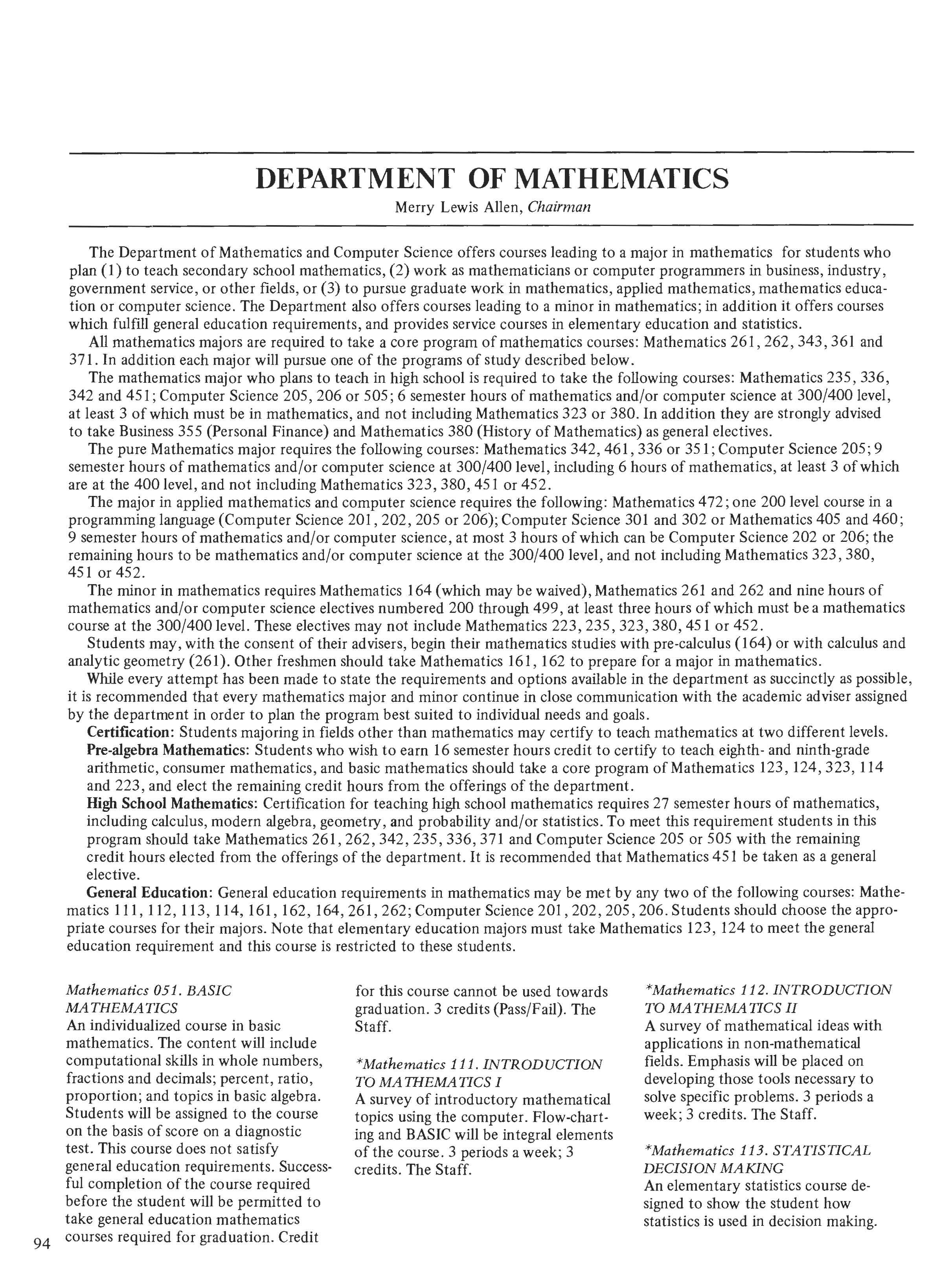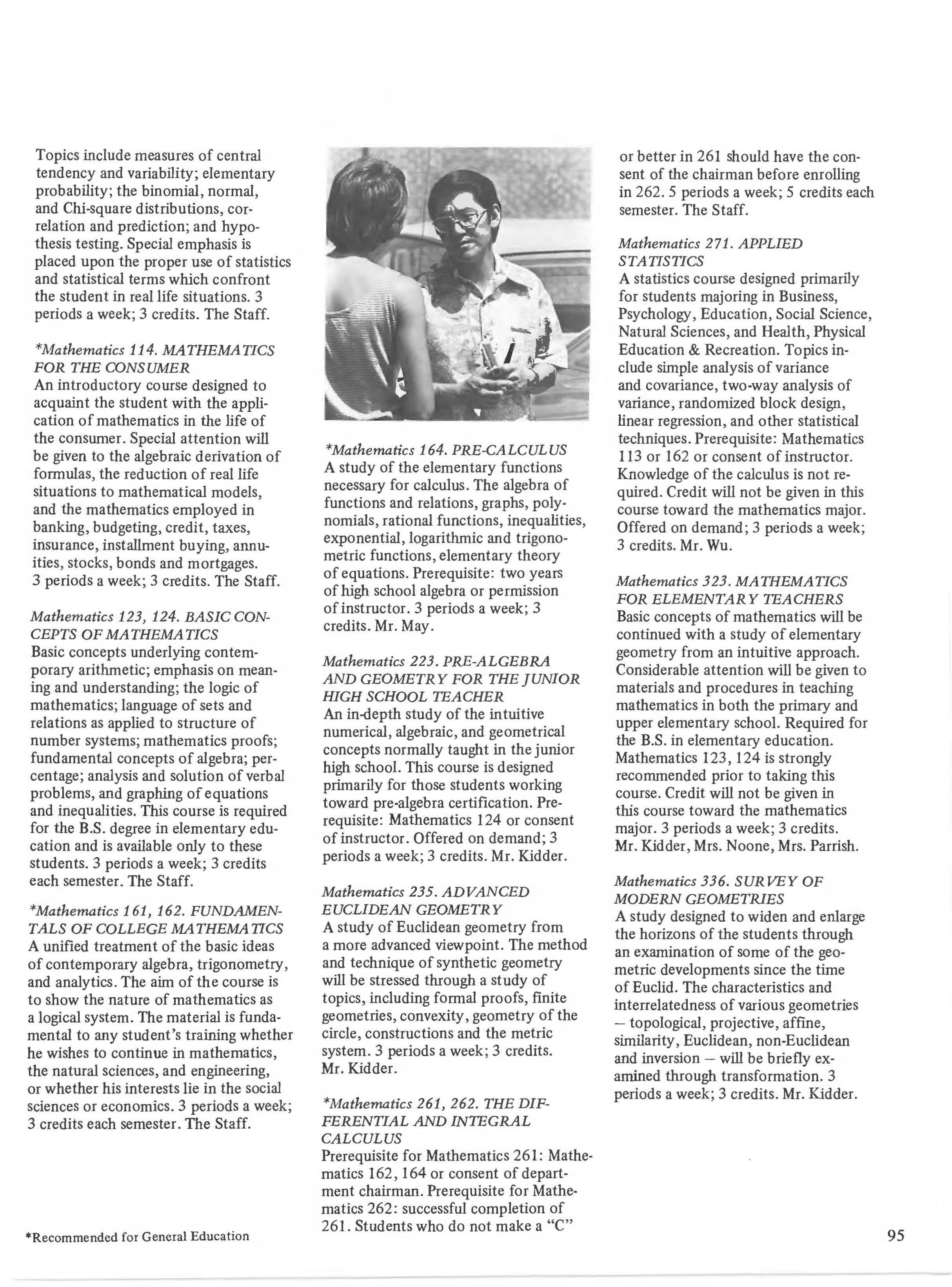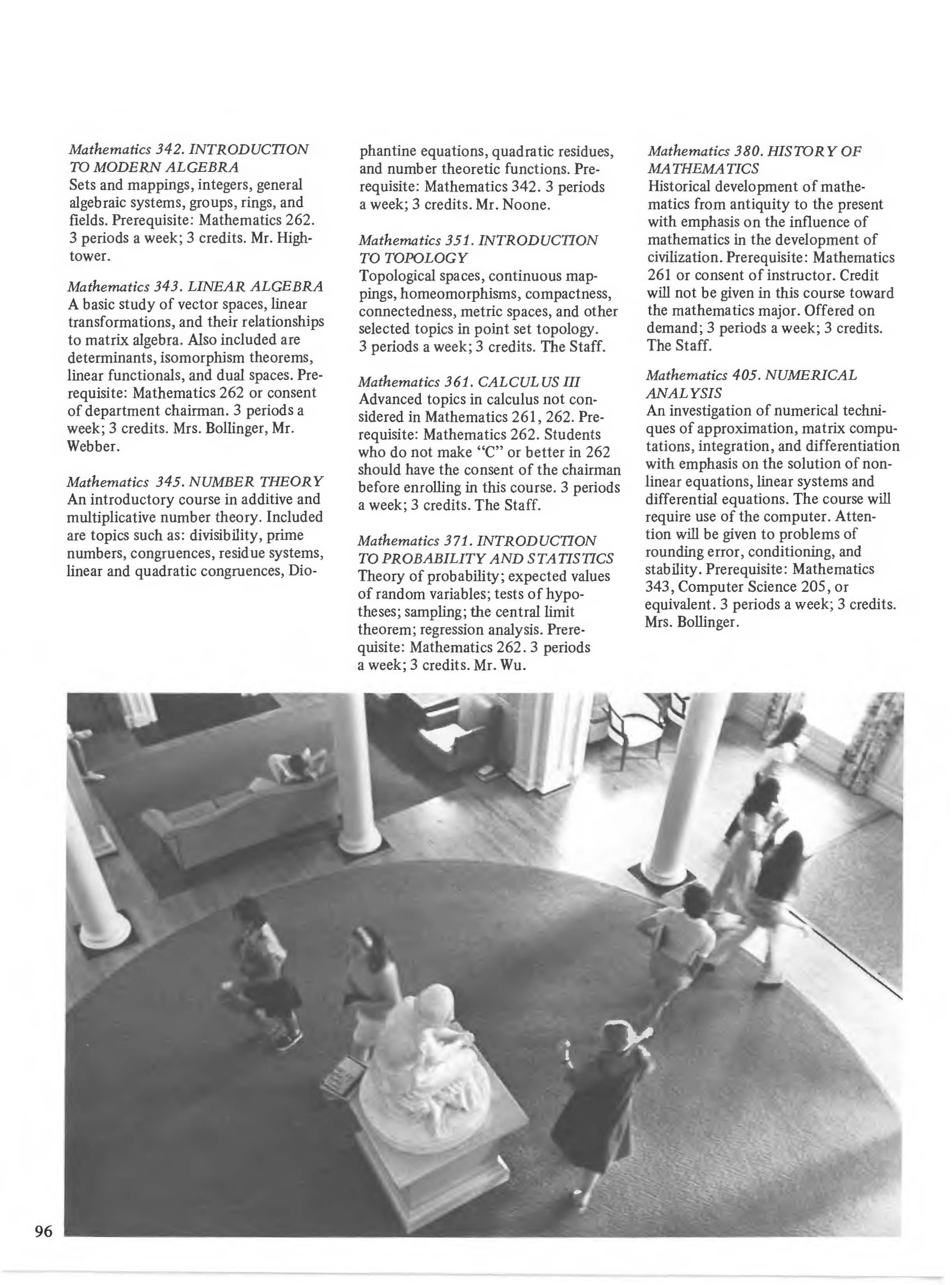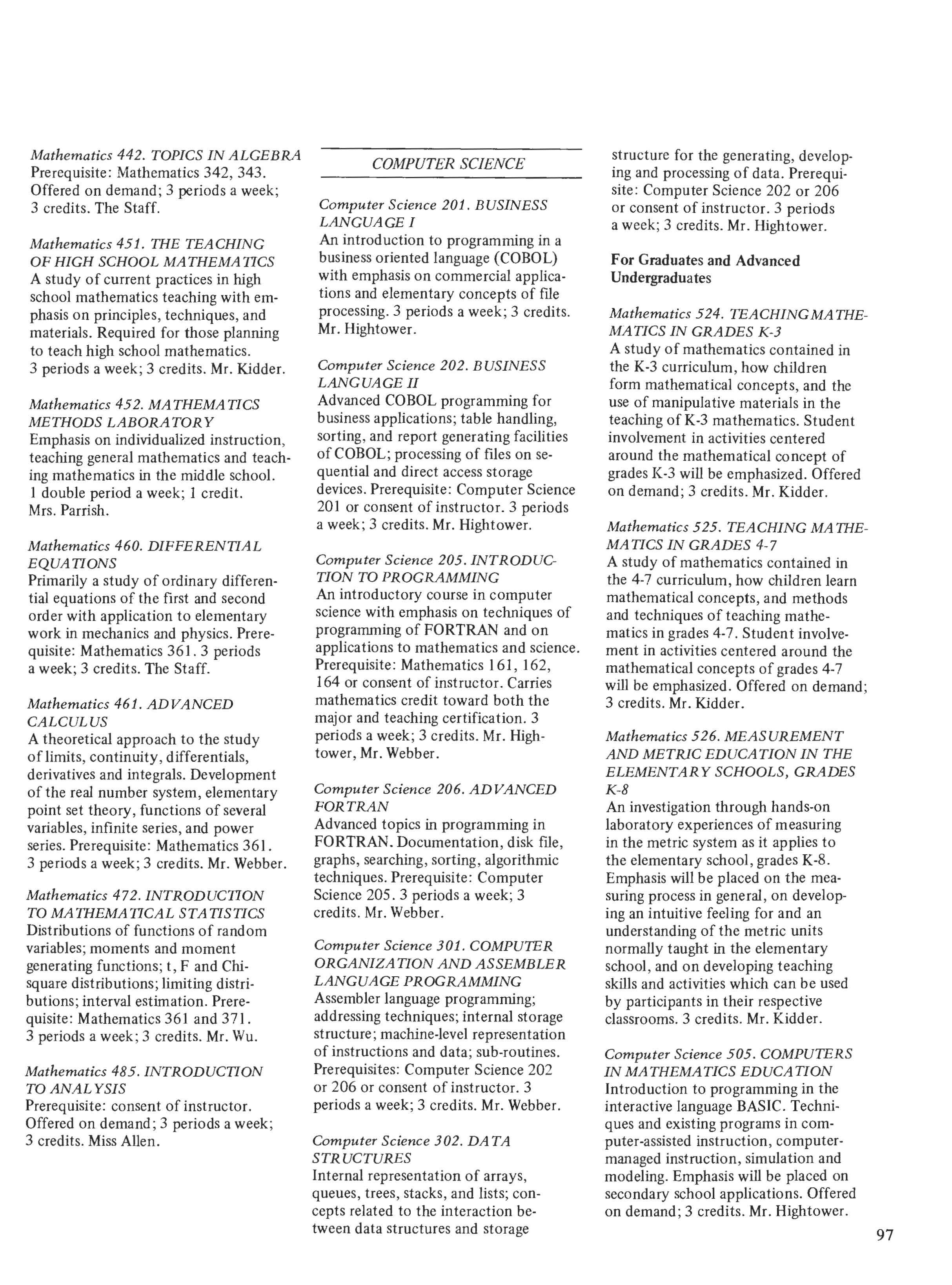
16 minute read
Department of Mathematics
Merry Lewis Allen, Chairman
The Department of Mathematics and Computer Science offers courses leading to a major in mathematics for students who plan (I) to teach secondary school mathematics, (2) work as mathematicians or computer programmers in business, industry, government service, or other fields, or (3) to pursue graduate work in mathematics, applied mathematics, mathematics education or computer science. The Department also offers courses leading to a minor in mathematics; in addition it offers courses which fulfill general education requirements, and provides service courses in elementary education and statistics.
All mathematics majors are required to take a core program of mathematics courses: Mathematics 26 I, 262,343,361 and 371. In addition each major will pursue one of the programs of study described below.
The mathematics major who plans to teach in high school is required to take the following courses: Mathematics 235, 336, 342 and 451; Computer Science 205, 206 or 505; 6 semester hours of mathematics and/or computer science at 300/400 level, at least 3 of which must be in mathematics, and not including Mathematics 323 or 380. In addition they are strongly advised to take Business 355 (Personal Finance) and Mathematics 380 (History of Mathematics) as general electives.
The pure Mathematics major requires the following courses: Mathematics 342, 461, 336 or 351; Computer Science 205; 9 semester hours of mathematics and/or computer science at 300/400 level, including 6 hours of mathematics, at least 3 of which are at the 400 level, and not including Mathematics 323, 380, 451 or 452.
The major in applied mathematics and computer science requires the following: Mathematics 4 72; one 200 level course in a programming language (Computer Science 201, 202, 205 or 206); Computer Science 301 and 302 or Mathematics 405 and 460; 9 semester hours of mathematics and/or computer science, at most 3 hours of which can be Computer Science 202 or 206; the remaining hours to be mathematics and/or computer science at the 300/400 level, and not including Mathematics 323, 380, 451 or 452.
The minor in mathematics requires Mathematics 164 (which may be waived), Mathematics 261 and 262 and nine hours of mathematics and/or computer science electives numbered 200 through 499, at least three hours of which must be a mathematics course at the 300/400 level. These electives may not include Mathematics 223,235,323,380, 451 or 452.
Students may, with the consent of their advisers, begin their mathematics studies with pre-calculus (I 64) or with calculus and analytic geometry (261). Other freshmen should take Mathematics 161, I 62 to prepare for a major in mathematics.
While every attempt has been made to state the requirements and options available in the department as succinctly as possible, it is recommended that every mathematics major and minor continue in close communication with the academic adviser assigned by the department in order to plan the program best suited to individual needs and goals.
Certification: Students majoring in fields other than mathematics may certify to teach mathematics at two different levels.
Pre-algebra Mathematics: Students who wish to earn 16 semester hours credit to certify to teach eighth- and ninth-grade arithmetic, consumer mathematics, and basic mathematics should take a core program of Mathematics 123, 124, 323, 114 and 223, and elect the remaining credit hours from the offerings of the department.
High School Mathematics: Certification for teaching high school mathematics requires 27 semester hours of mathematics, including calculus, modern algebra, geometry, and probability and/or statistics. To meet this requirement students in this program should take Mathematics 261, 262, 342, 235,336,371 and Computer Science 205 or 505 with the remaining credit hours elected from the offerings of the department. It is recommended that Mathematics 451 be taken as a general elective.
General Education: General education requirements in mathematics may be met by any two of the following courses: Mathematics 111, 112, 113, 114, 161, 162, 164, 261, 262; Computer Science 201 , 202, 205, 206. Students should choose the appropriate courses for their majors. Note that elementary education majors must take Mathematics 123, 124 to meet the general education requirement and this course is restricted to these students.
Mathematics 051. BASIC
MA TH EMA TICS
An individualized course in basic mathematics. The content will include computational skills in whole numbers, fractions and decimals; percent, ratio, proportion; and topics in basic algebra.
Students will be assigned to the course on the basis of score on a diagnostic test. This course does not satisfy general education requirements. Successful completion of the course required before the student will be permitted to take general education mathematics 94 courses required for graduation. Credit for this course cannot be used towards graduation. 3 credits (Pass/Fail). The Staff.
*Mathematics 111. INTRODUCTION TO MATHEMATICS I A survey of introductory mathematical topics using the computer. Flow-charting and BASIC will be integral elements of the course. 3 periods a week; 3 credits. The Staff.
*Mathematics 112. INTRODUCTION TO MA THEAM TICS II A survey of mathematical ideas with applications in non-mathematical fields. Emphasis will be placed on developing those tools necessary to solve specific problems. 3 periods a week; 3 credits. The Staff.
* Mathematics 113. ST A TIS TI CAL DECISION MAKING An elementary statistics course designed to show the student how statistics is used in decision making.
Topics include measures of central tenden~~ and variability; elementary probability; the binomial, normal, and Chi-square distributions, correla~ion a~d prediction; and hypothesis testmg. Special emphasis is placed upon the proper use of statistics and statistical terms which confront the student in real life situations. 3 periods a week; 3 credits. The Staff.
*Mathematics 114. MATHEMATICS FOR THE CONSUMER An in~roductory course designed to acquamt the student with the applicat10n of mathematics in the life of the consumer. Special attention will be given to the algebraic derivation of formulas, the reduction of real life situations to mathematical models and the mathematics employed in ' ?anking, budgeting, credit, taxes, msurance, installment buying, annuities, ~tocks, bonds and mortgages. 3 penods a week; 3 credits. The Staff.
Mathematics 123, 124. BASIC CONCEPTS OF MATHE.MA TICS Basic concepts underlying contem~orary arithmetic; emphasis on meanmg and understanding; the logic of mathematics; language of sets and relations as applied to structure of number systems; mathematics proofs; fundamental concepts of algebra; percentage; analysis and solution of verbal problems, and graphing of equations and inequalities. This course is required for. the B.S: degree in elementary educat10n and 1s available only to these students. 3 periods a week; 3 credits each semester. The Staff.
*Mathematics 161, 162. FUNDAMENTALS OF COLLEGE MATHEMATICS A unified treatment of the basic ideas of contemporary algebra, trigonometry, and analytics. The aim of the course is to show the nature of mathematics as a logical system. The material is fundamental to any student's training whether he wishes to continue in mathematics the natural sciences, and engineering, ' or whether his interests lie in the social sciences or economics. 3 periods a week· 3 credits each semester. The Staff. '

*Mathematics 164. PRE-CA LC UL US A study of the elementary functions necessary for calculus. The algebra of func~ions a~d relations, graphs, polynomials, rational functions, inequalities, exponential, logarithmic and trigonometric f~nctions, elementary theory of equations. Prerequisite: two years of !righ school algebra or permission ofu~structor. 3 periods a week; 3 credits. Mr. May.
Mathematics 223. PRE-ALGEBRA AND GEOMETRY FOR THE JUNIOR HIGH SCHOOL TEACHER An in-depth study of the intuitive numerical, algebraic, and geometrical c~ncepts normally taught in the junior high school. This course is designed primarily for those students working toward pre-algebra certification. Prerequisite: Mathematics 124 or consent of instructor. Offered on demand; 3 periods a week; 3 credits. Mr. Kidder.
Mathematics 235. ADVANCED EUCLIDEAN GEOMETRY A study of Euclidean geometry from a more advanced viewpoint. The method and technique of synthetic geometry will be stressed through a study of topics, including formal proofs, finite g~ometries, convexity, geometry of the crrcle, constructions and the metric system. 3 periods a week; 3 credits. Mr. Kidder.
*Mathematics 261, 262. THE DIFFERENTIAL AND INTEGRAL CALCULUS Prerequisite for Mathematics 261: Mathematics 162, 164 or consent of department chairman. Prerequisite for Mathematics 262: successful completion of 261. Students who do not make a "C" or better in 261 should have the con~ent of the c~airman before enrolling m 262. 5 penods a week; 5 credits each semester. The Staff.
Mathematics 271. APPLIED STATISTICS A statistics course designed primarily for students majoring in Business, Psychology, Education, Social Science, Natural Sciences, and Health, Physical Education & Recreation. Topics include simple analysis of variance an~ covariance, two-way analysis of ~anance, randomized block design, linear regression, and other statistical techniques. Prerequisite: Mathematics 113 or 162 or consent of instructor. Knowledge of the calculus is not required. Credit will not be given in this course toward the mathematics major. Offered on demand; 3 periods a week; 3 credits. Mr. Wu.
Mathematics 323. MATHEMATICS FOR ELEMENTARY TEACHERS Basic concepts of mathematics will be continued with a study of elementary geometry from an intuitive approach. Consi~erable attention will be given to matenals ~nd_procedures in teaching mathematics m both the primary and upper elementary school. Required for the B.S. in elementary education. Mathematics 123, 124 is strongly recommended prior to taking this course. Credit will not be given in this course toward the mathematics major. 3 periods a week; 3 credits. Mr. Kidder, Mrs. Noone, Mrs. Parrish.
Mathematics 336. SURVEY OF MODERN GEOMETRIES A study designed to widen and enlarge the horizons of the students through an examination of some of the geometric developments since the time of Euclid. The characteristics and interrelatedness of various geometries - topological, projective, affme similarity, Euclidean, non-Euclidean and inversion - will be briefly examined through transformation. 3 periods a week; 3 credits. Mr. Kidder.
Mathematics 342. INTRODUCTION TD MODERN ALGEBRA Sets and mappings, integers, general algebraic systems, groups, rings, and fields. Prerequisite: Mathematics 262. 3 periods a week; 3 credits. Mr. Hightower.
Mathematics 343. LINEAR ALGEBRA A basic study of vector spaces, linear transformations, and their relationships to matrix algebra. Also included are determinants, isomorphism theorems, linear functionals, and dual spaces. Prerequisite: Mathematics 262 or consent of department chairman. 3 periods a week; 3 credits. Mrs. Bollinger, Mr. Webber.
Mathematics 345. NUMBER THEORY An introductory course in additive and multiplicative number theory. Included are topics such as: divisibility, prime numbers, congruences, residue systems, linear and quadratic congruences, Diophantine equations, quadratic residues, and number theoretic functions. Prerequisite: Mathematics 342. 3 periods a week; 3 credits. Mr. Noone.

Mathematics 351. INTRODUCTION TO TOPOLOGY Topological spaces, continuous mappings, homeomorphisms, compactness, connectedness, metric spaces, and other selected topics in point set topology. 3 periods a week; 3 credits. The Staff.
Mathematics 361. CALCULUS III Advanced topics in calculus not considered in Mathematics 261, 262. Prerequisite: Mathematics 262. Students who do not make "C" or better in 262 should have the consent of the chairman before enrolling in this course. 3 periods a week; 3 credits. The Staff.
Mathematics 371. INTRODUCTION TO PROBABILITY AND STATISTICS Theory of probability; expected values of random variables; tests of hypotheses; sampling; the central limit theorem; regression analysis. Prerequisite: Mathematics 262. 3 periods a week; 3 credits. Mr. Wu. Mathematics 380. HISTDR Y OF MA TH EMA TICS Historical development of mathematics from antiquity to the present with emphasis on the influence of mathematics in the development of civilization. Prerequisite: Mathematics 261 or consent of instructor. Credit will not be given in this course toward the mathematics major. Offered on demand; 3 periods a week; 3 credits. The Staff.
Mathematics 405. NUMERICAL ANALYSIS An investigation of numerical techniques of approximation, matrix computations, integration, and differentiation with emphasis on the solution of nonlinear equations, linear systems and differential equations. The course will require use of the computer. Attention will be given to problems of rounding error, conditioning, and stability. Prerequisite: Mathematics 343, Computer Science 205, or equivalent. 3 periods a week; 3 credits. Mrs. Bollinger.
Mathematics 442. TOPICS IN ALGEBRA Prerequisite: Mathematics 342, 343. Offered on demand; 3 periods a week; 3 credits. The Staff.
Mathematics 451. THE TEACHING OF HIGH SCHOOL MATHEMATICS A study of current practices in high school mathematics teaching with emphasis on principles, techniques, and materials. Required for those planning to teach high school mathematics. 3 periods a week; 3 credits. Mr. Kidder.
Mathematics 452. MATHEMATICS METHODS LABORATORY Emphasis on individualized instruction, teaching general mathematics and teaching mathematics in the middle school. 1 double period a week; 1 credit. Mrs. Parrish.
Mathematics 460. DIFFERENTIAL EQUATIONS Primarily a study of ordinary differential equations of the first and second order with application to elementary work in mechanics and physics. Prerequisite: Mathematics 361. 3 periods a week; 3 credits. The Staff.
Mathematics 461. ADVANCED CALCULUS A theoretical approach to the study of limits, continuity, differentials, derivatives and integrals. Development of the real number system, elementary point set theory, functions of several variables, infinite series, and power series. Prerequisite: Mathematics 361. 3 periods a week; 3 credits. Mr. Webber.

Mathematics 472. INTRODUCTION TO MATHEMATICAL STATISTICS Distributions of functions of random variables; moments and moment generating functions; t, F and Chisquare distributions; limiting distributions; interval estimation. Prerequisite: Mathematics 361 and 371. 3 periods a week; 3 credits. Mr. Wu.
Mathematics 485. INTRODUCTION TO ANALYSIS Prerequisite: consent of instructor. Offered on demand ; 3 periods a week; 3 credits. Miss Allen. COMPUTER SCIENCE
Computer Science 201. BUSINESS LANGUAGE I An introduction to programming in a business oriented language (COBOL) with emphasis on commercial applications and elementary concepts of file processing. 3 periods a week; 3 credits. Mr. Hightower.
Computer Science 202. BUSINESS LANGUAGE II Advanced COBOL programming for business applications; table handling, sorting, and report generating facilities of COBOL; processing of files on sequential and direct access storage devices. Prerequisite: Computer Science 201 or consent of instructor. 3 periods a week; 3 credits. Mr. Hightower.
Computer Science 205. INTRODUCTION TO PROGRAMMING An introductory course in computer science with emphasis on techniques of programming of FORTRAN and on applications to mathematics and science. Prerequisite: Mathematics 161, 162, 164 or consent of instructor. Carries mathematics credit toward both the major and teaching certification. 3 periods a week; 3 credits. Mr. Hightower, Mr. Webber.
Computer Science 206. ADVANCED FORTRAN Advanced topics in programming in FORTRAN. Documentation, disk file, graphs, searching, sorting, algorithmic techniques. Prerequisite: Computer Science 205. 3 periods a week; 3 credits. Mr. Webber.
Computer Science 301. COMPUTER ORGANIZATION AND ASSEMBLER LANGUAGE PROGRAMMING Assembler language programming; addressing techniques; internal storage structure; machine-level representation of instructions and data; sub-routines. Prerequisites: Computer Science 202 or 206 or consent of instructor. 3 periods a week; 3 credits. Mr. Webber.
Computer Science 302. DATA STRUCTURES Internal representation of arrays, queues, trees, stacks, and lists; concepts related to the interaction between data structures and storage structure for the generating, developing and processing of data. Prerequisite: Computer Science 202 or 206 or consent of instructor. 3 periods a week; 3 credits. Mr. Hightower.
For Graduates and Advanced Undergraduates
Mathematics 524. TEACHINGMATHEMA TICS IN GRADES K-3 A study of mathematics contained in the K-3 curriculum, how children form mathematical concepts, and the use of manipulative materials in the teaching ofK-3 mathematics. Student involvement in activities centered around the mathematical concept of grades K-3 will be emphasized. Offered on demand; 3 credits. Mr. Kidder.
Mathematics 525. TEACHING MA THEMA TICS IN GRADES 4-7 A study of mathematics contained in the 4-7 curriculum, how children learn mathematical concepts, and methods and techniques of teaching mathematics in grades 4-7. Student involvement in activities centered around the mathematical concepts of grades 4-7 will be emphasized. Offered on demand; 3 credits. Mr. Kidder.
Mathematics 526. MEASUREMENT AND METRIC EDUCATION IN THE ELEMENTARY SCHOOLS, GRADES K-8 An investigation through hands-on laboratory experiences of measuring in the metric system as it applies to the elementary school, grades K-8. Emphasis will be placed on the measuring process in general, on developing an intuitive feeling for and an understanding of the metric units normally taught in the elementary school, and on developing teaching skills and activities which can be used by participants in their respective classrooms. 3 credits. Mr. Kidder.
Computer Science 505. COMPUTERS IN MA THEMATICS EDUCATION Introduction to programming in the interactive language BASIC. Techniques and existing programs in computer-assisted instruction, computermanaged instruction, simulation and modeling. Emphasis will be placed on secondary school applications. Offered on demand; 3 credits. Mr. Hightower.
COURSE REQUIREMENTS
The Department of Mathematics and Computer Science offers both a major and minor in mathematics. The major requires emphasis in one of three options: teacher certification, pure mathematics or applied mathematics and computer science. Students majoring in mathematics earn a Bachelor of Science or Bachelor of Arts degree.
General Education Requirements Art, Music or Dramatic Arts/6 credits English 100, l O 1/6 credits Literature/3 credits Humanities Elective/3 credits History 12 I or I 22/3 credits Mathematics 161, 162*/6 credits Social Science/9 credits Science/8 credits Health Education 100/1 credit Physical Education Activity Courses/3 credits TOT AL/48 credits (*May be by-passed. Check with department chairman.)
Major Requirements (all majors) Mathematics 26 I, 262, 36 l /I 3 credits Mathematics 343/3 credits Mathematics 3 71 /3 credits TOT AL/ 19 credits MA THEMATICS MAJOR B.S. DEGREE
Option I (Teacher Certification) Mathematics 235, 336/6 credits Mathematics 342/3 credits Mathematics 451/3 credits Computer Science 205, 206 or 505/3 credits *Electives: 300-400 level mathematics/3 credits 300-400 level compu tcr science or mathematics/3 credits
Option II (Pure Mathematics) Mathematics 34 2/3 credits Mathematics 336 or 351/3 credits Mathematics 461/3 credits Computer Science 205/3 credits *Electives: 400 level mathematics/3 credits 300-400 level mathematics/3 credits 300-400 level computer science or mathematics/3 credits Option III (Applied Mathematics and Computer Science) Mathematics 4 72/3 credits Computer Science 201,202, 205 or 206/ 3 credits Computer Science 301 and 302 or
Mathematics 405 and 460/6 credits *Electives: Computer Science 202 or 206 or 300-400 level computer science or mathematics/3 credits 300-400 level computer science or mathematics/6 credits
*Electives may not include Mathematics 323,280,451 or 452.
MINOR IN MATHEMATICS

Mathematics l 64* /3 credits Mathematics 261, 262/10 credits **Electives: 300-400 level mathematics/ 3 credits 200-400 level computer science or mathematics/6 credits *Or equivalent. This requirement may be waived for students beginning their mathematics studies with Mathematics 261.
**Electives may not include Mathematics 223,235,323,380,451 and 452.
FACULTY
Merry Lewis Allen, Associate Professor and Chairman
B.S., College of William and Mary;
M.S., University of Illinois; M.Ed.,
Ed.D., University of Virginia Sandra A. Bollinger, Assistant Professor
B.A., Longwood College; M.M., University of South Carolina James C. Gusset!, Associate Professor
B.S., United States Naval Academy;
M.Ed., Ed.D., University of Cincinnati William L. Hightower, Assistant Professor
B.A., Kalamazoo College; M.S., Ph.D.,
Michigan State University F. Richard Kidder, Associate Professor
B.A., M.A., San Diego State College;
Ed.D., University of Georgia Robert D. May,Assistant Professor
B.A., Swarthmore College; Ph.D.,
Harvard University E.T. Noone, Jr., Associate Professor
B.S., M.S., Northwestern State University; Ed.D., University of Southern
Mississippi Jean A. Noone, Assistant Professor
B.S., Madison College; M.M., University of South Carolina Cada R. Parrish, Assistant Professor
B.S., West Virginia Wesleyan College;
M.S., Stetson University Robert P. Webber, Associate Professor
B.A., University of Richmond; M.S.,
Stephen F. Austin State College; Ph.D.,
University of Tennessee Robert S. Wu, Associate Professor
B.S., Illinois Institute of Technology;
M.S., DePaul University; Ph.D., University of Northern Colora 1o










